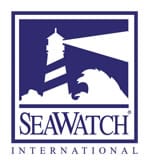Sustainable Fishery
Sea Watch International achieved Marine Stewardship Council (MSC) certification, the world’s most credible standard for sustainable wild-caught seafood, on Dec. 2016. The MSC is an international nonprofit organization established to set global scientific standards for sustainable fishing practices and to ensure an ocean teeming with life for this and future generations. We’re committed to fishing sustainably and are proud to be a leader in protecting the world’s oceans and supporting sustainably managed fisheries. Sea Watch MSC Chain of Custody Certification Number: MSC-C-55796.
Sea Watch International is reliant on the health of our global environment because our business begins with the wild harvest of two species of clams (Atlantic Surf Clam and Ocean Quahog). If for no other reason we take our stewardship of the environment very seriously. The first order of business as a leader of the offshore clam industry is to work closely with the National Marine Fisheries to manage our fishery in a sustainable manner. This has been done since 1978 under the Magnuson-Stevens Act, which mandates sustainability by virtue of our quota system. The Domestic Offshore Clam industry in the USA is considered by many around the world to be among the best-managed fisheries on the planet.
Sea Watch International United States Offshore Clam Fisheries Sustainability
- 1) Stock StrengthBased on current and historical peer reviewed data, Sea Watch endorses the sustainability of the Atlantic Surf Clam and Ocean Quahog Fisheries based on the position of the National Marine Fisheries Service, NOAA which states.a. * “The Atlantic Surfclam stock in the US EEZ (Exclusive Economic Zone, 3 to 200 nm from the shore, is not overfished and overfishing is not occurring. Surfclam biomass varies with latitude. Relative to historic conditions, the southern regions (DMV and NJ) recruitment, growth rate, and biomass have declined. In contrast, surfclam biomass and recruitment have increased on Georges Bank and Long Island region.”Overfishing: According to the national Standard Guidelines, “overfishing occurs whenever a stock or stock complex is subjected to a rate or level of fishing mortality that jeopardizes the capacity of a stock or stock complex to product MSY on a continuing basis.” Over fishing is occurring if the MFMT is exceeded for 1 year or more.b. * “The ocean quahog is not overfished and overfishing is not occurring.” “These estimates for ocean quahog in the US Exclusive Economic Zone (EEZ) do not include the Maine Fishing grounds, which were assessed separately (see below). However, biomass and landings for Maine waters are minor and would have no appreciable effect on estimates for the stock as a whole.”
*56th Northeast Regional Stock Assessment Workshop, Northeast Fisheries Science Center Reference Document – Available at http://nefsc.noaa.gov/publications/crd/crd1304/parta.pdf - 2) Environmental Impact – Hydraulic DredgingImpacts to Essential Fish Habitat (EFH) are Minimal and Temporary.
The prime habitat of surf clams and ocean quahogs consist of shallow sandy substrates with no vegetation or be or benthic ‘structures’ that could be damaged by the passing of a hydraulic dredge. In these ‘high energy’ environments, it is thought that the recovery time following passage of a clam dredge is relatively short. Additionally, the overall area impacted by the clam fisheries is relatively small (approximately 100 square nautical miles), compared to the large are of high energy sand on the continental shelf. Any impacts to EFH are considered temporary and minimal.
Information Provided by: Mid-Atlantic Fishery Management Council in cooperation with the National Marine Fisheries Service. - 3) TraceabilityThe ITQ system that is used by the NMFS to control the allocation system for the Atlantic Surf Clam and Ocean Quahog Fisheries makes traceability the law and is backed by Federal enforcement agencies.


